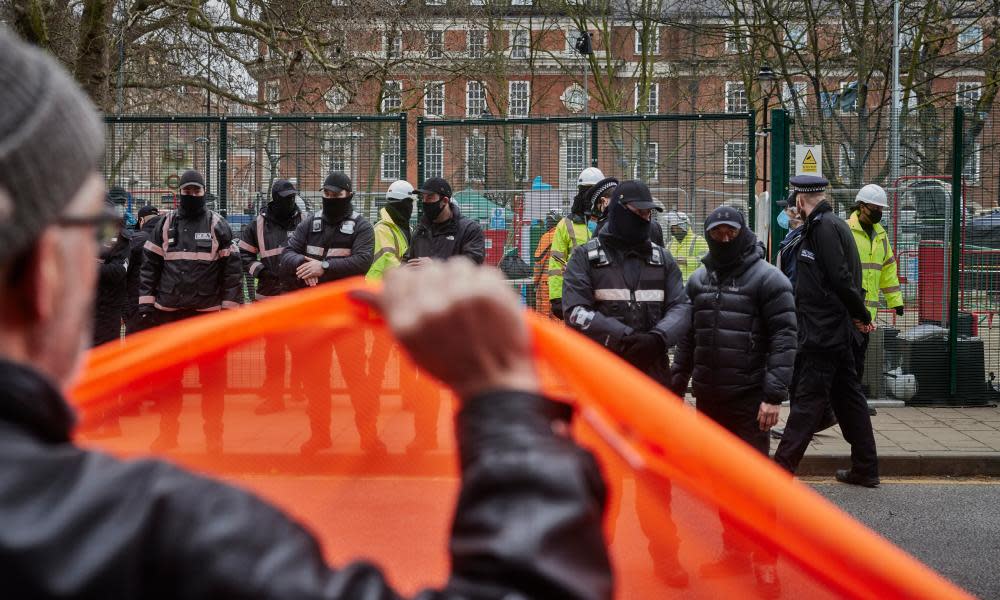UK introducing three laws that threaten human rights, says UN expert

Boris Johnson’s government is introducing three pieces of legislation that will make human rights violations more likely to occur and less likely to be sanctioned even as averting climate catastrophe depends on these rights, the UN special rapporteur for human rights and the environment has said.
“These three pieces of legislation are shrinking civic space at a time when the global environment crisis demands that people’s voices be heard,” said David Boyd.
He was referring to the policing bill, which proposes changes to enforcement and sentencing, the covert human intelligence sources bill, which protects undercover state agents from prosecution for crimes, and plans to weaken judicial review, the process to challenge ministerial decisions, including on the environment.
These developments are “counter to the direction we need to be going in” at a time when the “right to the freedoms of assembly, association and expression are absolutely critical to environmental progress”, said Boyd.
“One of the fundamental rights in jeopardy is access to justice and the changes to judicial review are a threat to that basic right,” he said.
He was speaking after campaign group Not1More wrote to the UN urging intervention to protect the rights of peaceful protesters in the UK. Not1More said each piece of legislation would make “people who wish to access their democratic right to peaceful protest more vulnerable to undue restrictions, arbitrary detention and/or invasive policing”.
The London-based group urged the UN to call for “accountability and no extension to police powers to curtail or break up protests or temporary encampments, and an end to violence against peaceful protesters”, which it says is increasing in the UK.
New police powers to break up unauthorised temporary encampments would enable them to remove peaceful protesters from woodland protection camps near the HS2 rail development, and “residing in an unauthorised encampment would become an offence punishable with three months’ imprisonment or a fine up to £2,500”, it said.
In a recent report to the UN with law firm Global Diligence LLP, Not1More documented 400 incidents of police allegedly using unwarranted aggressive behaviour to deter protesters against shale fracking and the HS2 line. It claimed police had violated protesters’ rights under international law, targeted people based on gender and disability and endangered lives, citing last year’s tunnel eviction in Euston.
Boyd said he could not immediately verify those incidents but “any attack on any vulnerable population paints a disturbing picture”.
“If you put this in the context of the global environmental crisis, the people trying to push us to address this crisis deserve our full support – it is in the public interest,” he said. “Protest is not the first thing that people do – taking part is a desperate act in a desperate time when we face desperate environmental challenges.”
Referring to the recent moratorium on logging after protests on Vancouver Island, Canada, he said: “We have seen this again and again – protests have the impact we need.
“The global picture is quite nuanced in terms of countries increasing repression – but the Universal Declaration of Human Rights is 75 years old and it’s troubling when a country as wealthy and powerful as the UK is not moving in this direction.”
He said: “There will have to be a backlash. If people see the UK government as increasingly repressive, at some point they will throw it out. These actions are counterproductive – we saw this in the US, where a terrible, repressive government has been replaced with an administration that in many ways is pro-human rights and pro-sustainability.”
A government spokesperson said: “The right to protest is a cornerstone of our democracy. Our proposed measures are in line with human rights legislation and in no way curtail on the right to protest.
“Public order legislation is out of date, these new measures will balance the rights of protesters with the rights of others to go about their business unhindered. They will achieve this by enabling the police to better manage highly disruptive protests which have costs millions to the taxpayer and causes misery to businesses and local communities.”

 Yahoo Movies
Yahoo Movies 
